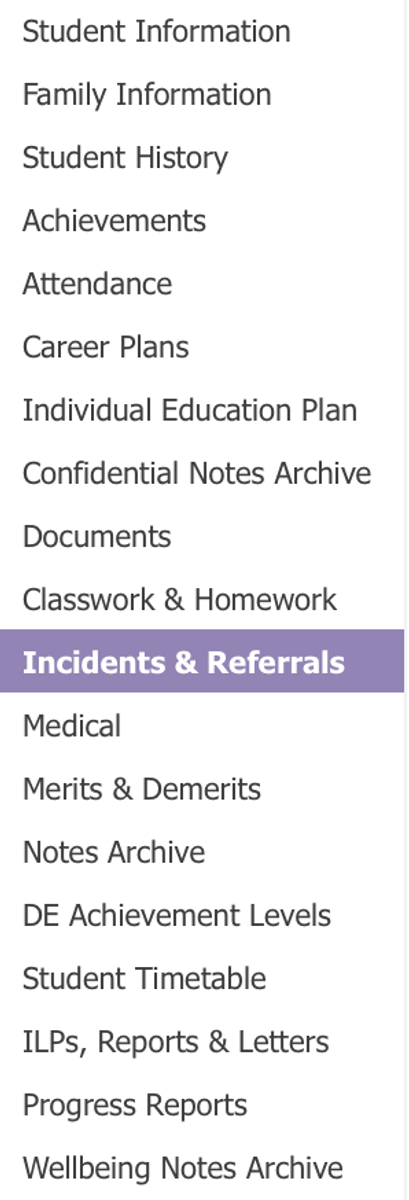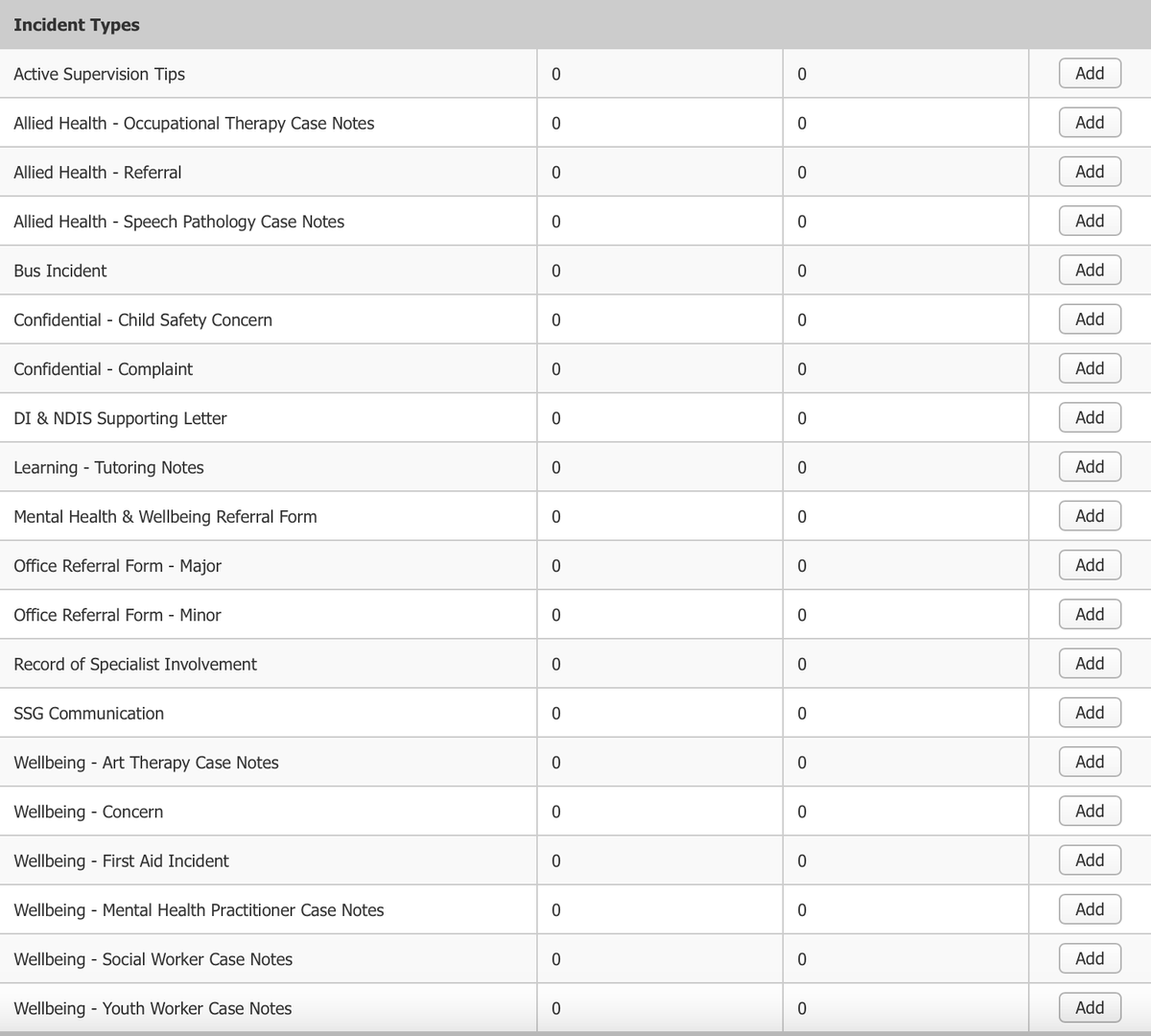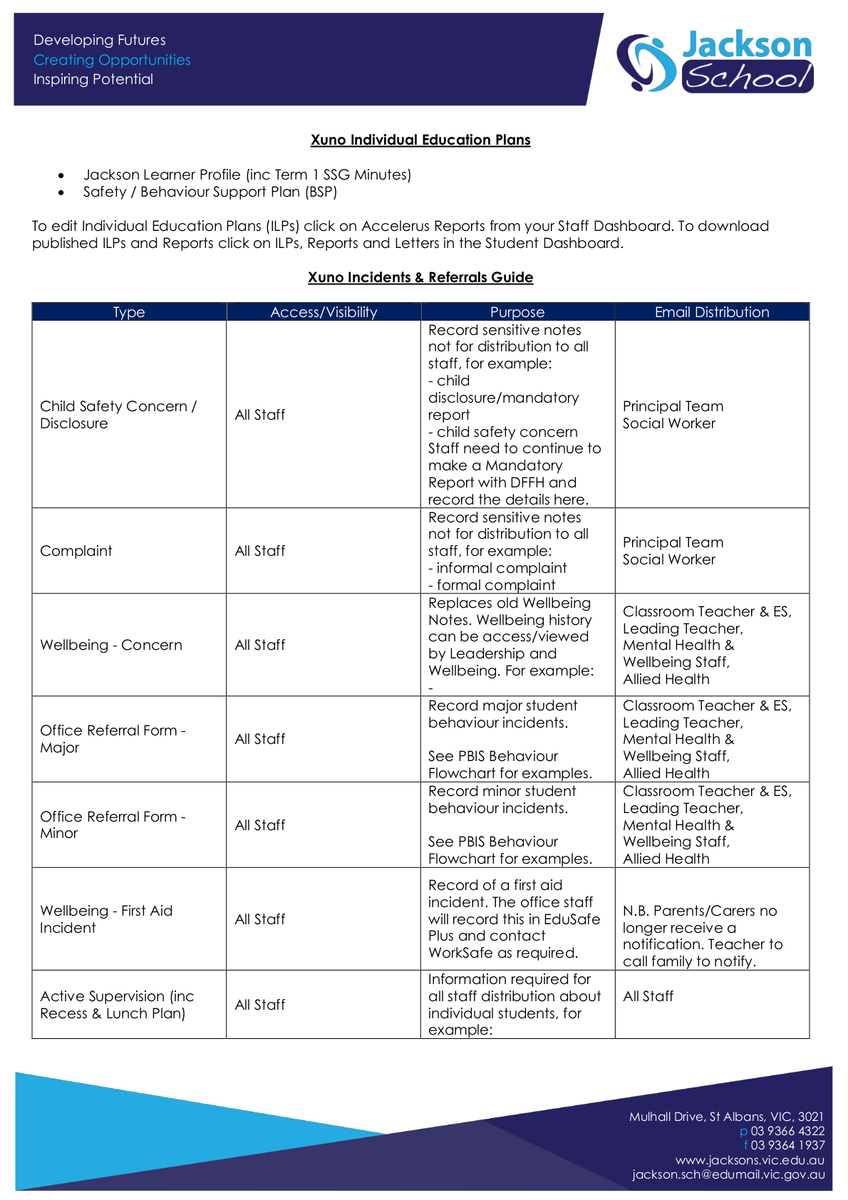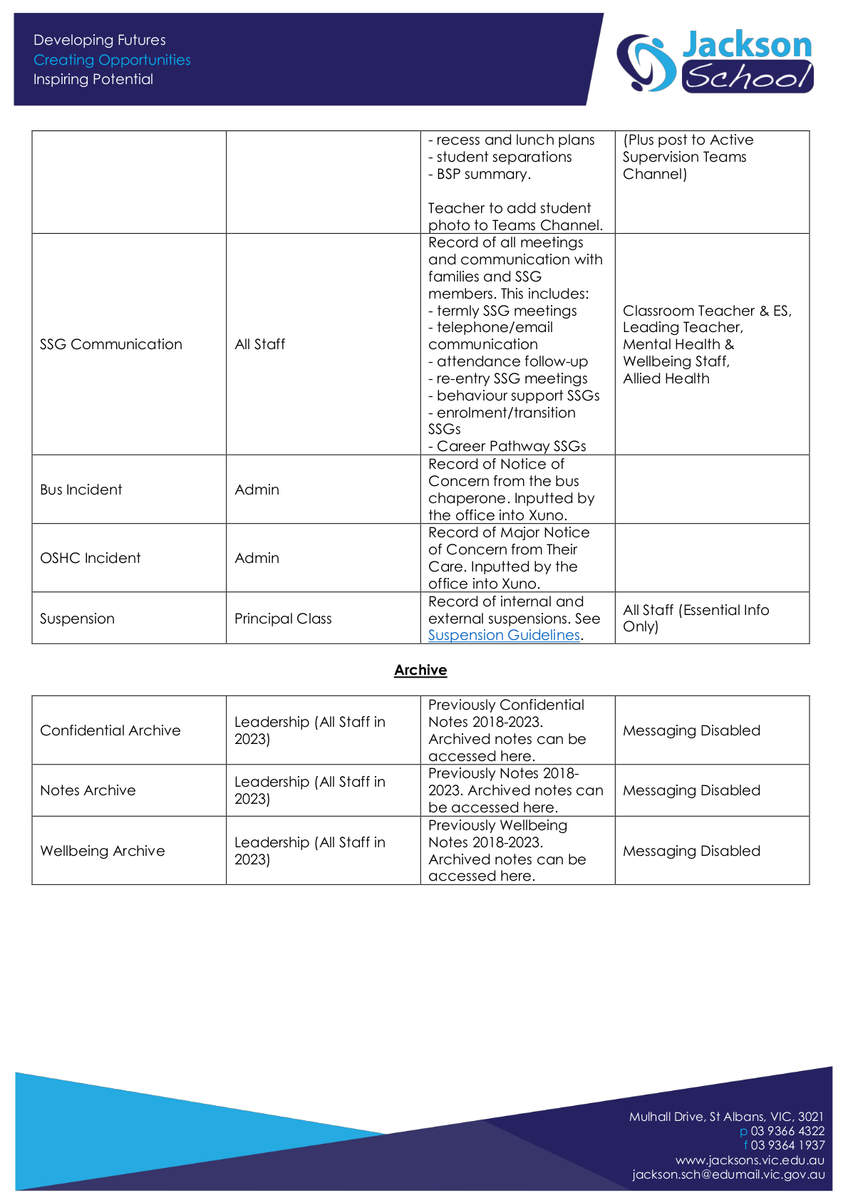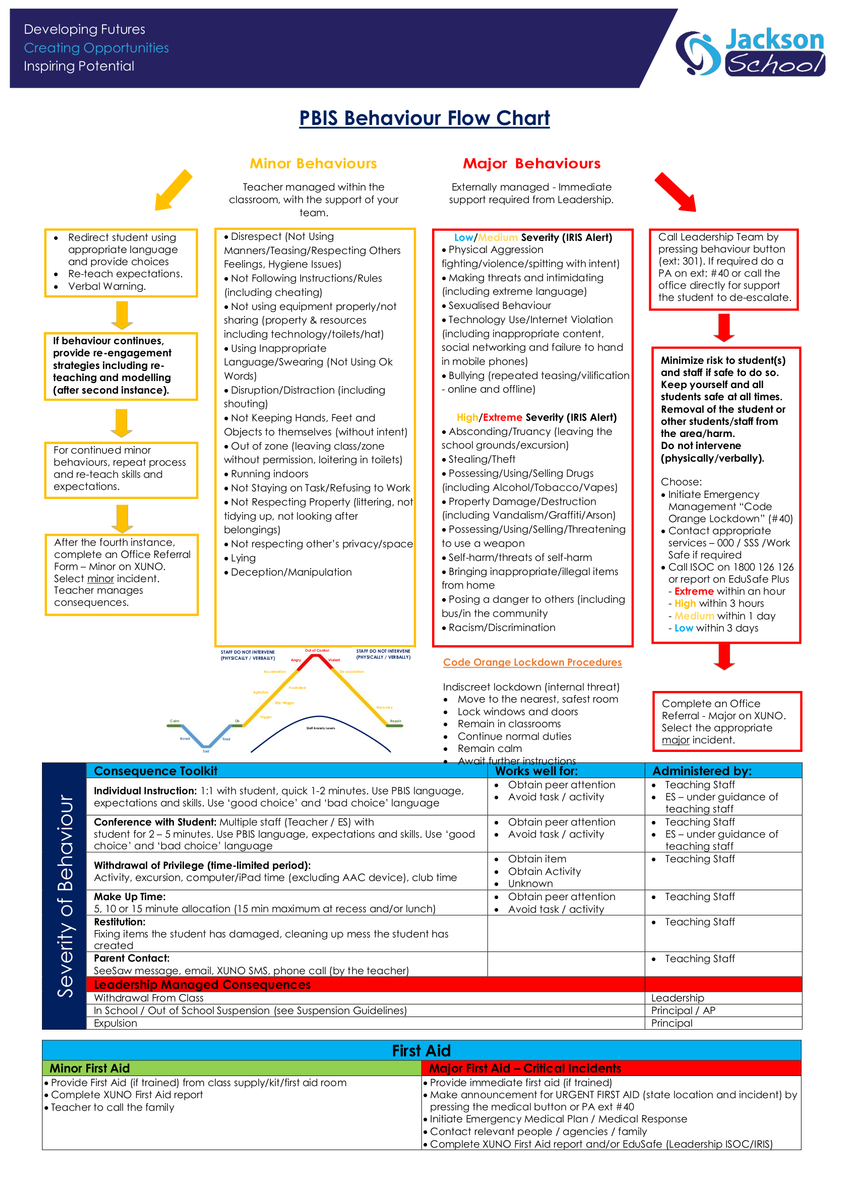Mental Health & Wellbeing

Xuno Incidents, Notes and Referrals
To streamline our processes, we have relocated our confidential, wellbeing and general notes in Xuno, all under Incidents, Notes and Referrals. The historic confirdential, wellbeing and general notes will still be able to be viewed in 2024 and are now named "Confidential Notes Archive", "Wellbeing Notes Archive" and "Notes Archieve".
We have developed an Incidents and Referrals Quick Guide to support staff with this change. It details who has access/visibility of the incident, note or referral. It also has a description of the purpose to avoid any duplications, e.g. between Office Referral Form - Minor and Wellbeing - Concern. It also details the email distribution of who gets which incident/referral. New incidents/referral forms include:
- Confidential - Child Safety Concern
- Confidential - Complaint
- Wellbeing - Concern
- SSG Communication
- Active Supervision Tips
For any child safety concerns or disclosures, staff should now record this under "Confidential - Child Safety Concern". Further information on what detail to include is available in the PROTECT Template on the Portal front page.
For all parent/family communication (phone, email, SSG meetings...), with the exception of the upcoming Term 1 SSGs, please use the incident named "SSG Communication". This is to ensure there is a printable chronology of our ongoing contact with families. This does not replace day-to-day communication between teachers and families on SeeSaw.
Additional Cases Notes for (Allied Health, Art Therapy, Mental Health Practitioner, Social Worker, Youth Worker, and Tutoring) are not covered by this guide as they are individual to specific staff.
Over Term 1 we will continue to refine these process and our whole school documentation.
Behaviour Flow Chart 2024
Staff should continue to redirect a student, re-teach expectations using the language of the skills on our PBIS posters, and repeat this process three times to reinforce our expected behaviours. In the fourth instance, staff should write a minor incident "office referral" form. These are managed by the teacher in the classroom with the support of your team.
Major behaviours are initially managed within the classroom where possible, but leadership may be required to support the behaviour and de-escalate the situation. It is vitally important that you keep yourself and other students safe at all times. Where required, remove the other students from the zone.
We are attempting to reduce the amount of PA announcements throughout the school day. This is disruptive to classroom learning, neighbours and meeting with families and external visitors. For Behaviour Support, staff should continue to call 301. Following staff feedback, we are now setting up virtual extensions so that this calls leadership mobile phones instead of office phones. We are also purchasing new cordless handsets. Where possible, your sub-schools leading teacher will be the first to respond to ensure consistency aligned with the student's behaviour support plan. Where they are not available or dealing with another behaviour, other members of leadership can also attend to support. Do not intervene physically or verbally if the student is escalated.
For major or critical behaviours, a PA announcement can be made using #40 for "support to class/location, please". Staff may also call an orange lockdown during an emergency management situation. If staff do, please also call for leadership support and state the location of the emergency.
The PBIS Behaviour Flow Chart:
Restraint and Seclusion Policy
Last year, restraint and seclusion were been a hot topic within the media for people with a disability. Where this pertains more to NDIS therapists working with neurodiverse students with autism spectrum disorder and intellectual disabilities, the following policy guidance below is a good reminder for us all.
The Restraint and Seclusion policy outlines the circumstances where physical restraint and seclusion are permitted in Victorian government schools.
Physical restraint and seclusion are only permitted in exceptional circumstances where it is necessary to protect the physical safety of a student or another person.
The policy outlines reporting and notification requirements and the responsibilities of school and corporate staff in relation to incidents of physical restraint and seclusion.
School staff must never use physical restraint and seclusion as behaviour management techniques, for convenience, as retaliation, or to discipline or punish a student.
Physical restraint must never be used where it has the effect of:
- covering a student’s mouth or nose, or in any way interferes with breathing
- taking a student to the ground into the prone or supine position
- putting stress on a student’s joints
- applying pressure to the neck, back, chest or joints
- deliberately applying pain to gain compliance
- intentionally causing a student to fall
- having a person sitting, lying, or kneeling on a student.
The following behaviours are prohibited:
- headlocks, choke holds, basket holds, bear hugs, therapeutic holding or wrestling holds (including full or half nelsons)
- using a hog-tied position
- straddling any part of a student's body
- dragging a student along the ground.
Physical restraint and seclusion must never be included in a student plan including behaviour support and student safety plans. Designated seclusion rooms and areas that are primarily used for the purpose of seclusion are prohibited. Preventing a student from leaving an area normally used by students with a locking mechanism is prohibited.
Doors and door handles installed in such a manner as to prevent a student from leaving the room unassisted are prohibited. Physical restraint is not permitted to be used to vaccinate a student.
The Department has recently updated the Restraint and Seclusion policy to:
- list supervised situations that do not meet the definition of seclusion
- include additional information about new professional development to help school staff learn more about the policy
- provide guidance to help schools and National Disability Insurance Scheme (NDIS) practitioners to work together. For example, it is the responsibility of a school principal to determine whether a NDIS behaviour support practitioner can attend a school site and whether student information can be provided to them.
Please familiarise yourself with the updated policy and your school’s responsibilities.
SunSmart
Here is the video from our Jackson Student Leadership Team (JSLT) about being SunSmart.
For Primary students from 14th August to 30 April 2024, all students must wear a sun-protective hat that shades the face, neck and ears for all outdoor activities. Hats may also be worn for all outdoor activities outside of the August to April time period, by parent or student choice.
For secondary students, we expect them to take responsibility for their sun safety by wearing a hat during outdoor activities and adopting other sun protection measures such as wearing sunscreen or using shade.
All staff should model SunSmart behaviours when on active supervision duty.
When the UV is 3 or above, be SunSmart!

